Did you know that the AARP has found 87% of seniors want to “age in place” by remaining in their own home during their golden years? If you’re over the age of 65 or have an elderly loved one, you’re probably wishing there was some kind of safety net for seniors living alone.
That’s where top-rated medical alert systems come into play by providing the confidence that comes with knowing you can quickly and easily get expert assistance in the event of a painful fall or another medical emergency.
Choosing the best medical alert device can seem like a monumental undertaking and leave you with a lot of questions. That’s why we’ve created this in-depth collection of answers to the top medical alert system frequently asked questions.
What is a Medical Alert System?
Monitored medical alert systems work by connecting users with a trained operator during an emergency. When the help button located in a neck pendant, bracelet, or another type of medical alert device is pushed, you simply speak out loud and tell the operator what kind of help you need.
Non-monitored medical alert systems work in a similar way, but when the help button is pressed, instead of speaking with a live operator, a pre-recorded message is sent to the emergency contact phone number on file, letting the person on the other end of the line know there is a problem at the address associated with the medical alert device user.
Want more details? Check out our in-depth guide to how medical alert systems work.
Who Should Use a Medical Alert System?
Medical alert systems are a great way to get 24/7 peace of mind in the event of a medical emergency. This makes them an ideal choice for senior citizens or those suffering from a chronic illness. Medical alert devices not only put you instantly in contact with an operator trained to handle medical emergencies, but many of them also provide automatic fall detection or a panic alarm to alert emergency response personnel that there’s a problem in your home without you ever having to pick up the phone.
What Does “PERS” Mean?
PERS is an acronym for “personal emergency response system,” which is another name for a medical alert system. Many medical professionals use PERS as shorthand for medical alert systems when referring to them in patient charts.
How Does a Medical Alert System Work?
While it can seem as if medical alert systems are difficult to understand, we’ve come up with a quick and easy way to explain how the medical alert systems work to help you.
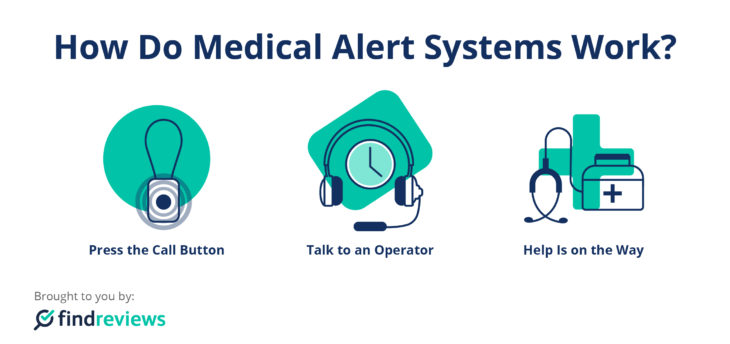
- You experience a medical emergency
- Press the call button on your medical alert device
- A trained operator answers the call to assist you
- If needed, local emergency responders are sent out
- The operator notifies you your emergency contacts
- You stay on the line with the operator until help arrives
What is a Medical Alert Base Unit?
Also referred to as a “base station” or “home station,” a medical alert base unit it is the foundation of in-home medical alert systems. Essentially, the base unit is a speakerphone with a microphone that is more sensitive than traditional phone systems. Each one comes with a medical alert device that wirelessly connects with the base unit and batteries that will last around 36 hours, even during an electrical blackout.
Medical alert base units work with either landline or cellular connections, depending on the one you choose when you sign up for a personal emergency response system. Landline medical alert base units are usually more affordable but don’t provide the reliability or range of cellular options that work with well-known mobile phone networks like AT&T or Verizon.
What is a Medical Alert Pendant?
Medical alert pendants are wireless devices that are usually no bigger than a quarter and which are worn around the neck or the wrist. When the help button is pressed in a medical alert pendant, a wireless signal contacts the base unit, and you are connected to a 24/7 medical monitoring call center to speak with an operator that will assess your situation and send help.
What is the Wireless Range of a Pendant?
Medical alert device range depends on the individual product and can average anywhere from 100s to 1,000s of feet. For example, the Medical Guardian landline unit comes with a pendant that’s been shown to have a straight range of 2,000 feet, while others only reach about 600.
Should a Medical Alert Pendant Be Worn 24/7?
You should only wear your medical alert pendant when you feel comfortable. But remember that no medical alert system can do its job and help keep you safe if you aren’t using it properly. If you want to get the most out of your PERS, you should wear your medical alert pendant at all times, especially during bathtime, which is when most dangerous falls happen.
Are Medical Alert Pendants Waterproof?
Only wear a medical alert pendant in the shower or bath when it’s been tested and proven to be 100% waterproof. Most of the best medical alert devices are now able to work when fully submerged but you should check the details for your specific device before using it in the tub.
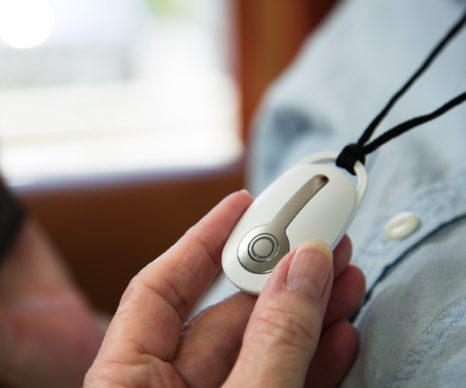
How Reliable Are Medical Alert Pendants?
The top-rated medical alert devices that we reviewed have gone through real-world testing to ensure they’re completely reliable. For example, reliable medical alert devices should be able to function around any and all electronic appliances without interference, work every time the help button is pressed, and maintain the promised signal range whether there are walls between the pendant and the base unit or not.
What is a Mobile Medical Alert Device?
Most premium medical alert packages offer a mobile option which turns your medical alert device into a type of cell phone. Mobile medical alert devices work by combining base units and pendants into one, which allows you to speak to an operator directly through the device itself.
What is the Best Medical Alert System for Me?
When choosing the right medical alert device for yourself or a loved one, you need to consider your activity level, location, and budget. Take a look at real user reviews on medical alert devices and consider the pros and cons before committing. Want some more help? Check out our Ultimate Guide to Medical Alert Systems for in-depth information.
Are Fall Detection Pendants Worth It?
Many of the best medical alert companies offer at least one device with automatic fall detection, which uses accelerometers and gyroscopes to measure G-force and body rotation. If you experience a fall, these sensors will automatically detect it, and your medical alert monitoring center will be alerted. An operator will contact you instantly and assess the situation.
Whether or not fall detection is worth it depends on your personal circumstances and budget. If you have experienced falls in the past or have been warned by a doctor that you’re at an increased risk of falling, the peace of mind fall detection devices provide can give you peace of mind that’s much more valuable than an additional $5 to $10 per month in your medical alert system cost.
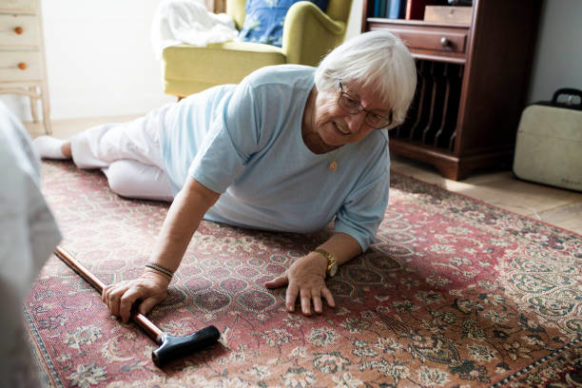
Do Medical Alert Companies Operate Their Own Call Centers?
It can be tough to know if a medical alert company owns and operates their own call centers, simply because so many of them outsource their calls to third-party companies, but are reluctant to discuss the matter.
Many medical alert companies allow for third-party partnerships in the terms and conditions of their service contracts. This isn’t necessarily a bad thing but if it’s important to you, there are only two options. Both GreatCall and ADT confirmed that they own and operate their emergency monitoring centers.
Should I Choose a Company That Doesn’t Outsource Services?
This choice is one that only you can make. From what we could tell when reviewing the top medical alert systems, owning and operating a call center didn’t make a difference in the quality of service that was provided. We found all the providers had U.S.-based trained professionals answering calls in multiple locations to make sure users always received a response.
Do Medical Alert Call Centers Support Non-English Speakers?
Many medical alert companies claim to support up to 200 foreign languages. But most emergency monitoring call centers don’t provide a full list of language accommodations, so it can be difficult to test such claims.
If you or your elderly loved one doesn’t speak English well, you should confirm which languages are supported before signing up for any medical alert system. You might also want to set up a month-to-month subscription to test how well communications go before committing to any long-term contracts.
Do Medical Alert Emergency Calls Ever Go Unanswered?
One of the biggest reasons people choose to have a medical alert system is gaining the confidence that comes with knowing they have 24/7 access to emergency assistance. This is why every medical alert provider we reviewed has back-up monitoring centers. If the power goes out in one call center, there are multiple other locations ready to take over service. You don’t have to worry about your emergency calls going unanswered with any of the top-rated medical alert companies.
What Training Do Medical Alert Operators Receive?
Medical alert operators receive the same type of training as Emergency Medical Technicians (EMTs). They are also trained to meet or exceed the standards of 911 operators.
What Happens if the Medical Alert Operator Can’t Hear Me?
Medical alert base units are designed to have very sensitive microphones. This is so they can pick up your voice from anywhere in your home. But in case there is ever a time when your medical alert operator can’t understand what you’re saying, they are trained to be cautious and diligent by sending out local emergency responders to your home.
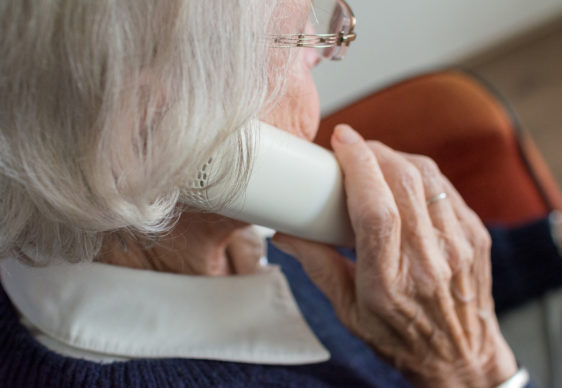
Do I Have to Worry About False Alarms?
For the most part, false alarms with medical alert systems aren’t something that you should worry about. Of course, there will inevitably be times when you or a loved one will accidentally activate the device by hitting the button by mistake. In that case, you just simply need to let the operator know what happened. Most operators will ask you several times if everything is okay and let you know there are no issues on their end. But that’s the extent of what happens with medical false alerts.
How Long Does It Take for Medical Alert Operators to Respond?
According to our testing, the average medical alert device response time is 69 seconds. In our opinion, this is too much time. Every second counts in a medical emergency. You should put the medical alert companies with the fastest response time at the top of your list. And if you’re looking for the fastest, you should go with GreatCall – they have an average response time of just under 21 seconds.
What Are the Most Common Medical Alert Packages?
While every medical alert service on the market may have different pricing packages, most of them work on a three-tier model of Base, Midrange, and Premium.
Base packages usually include a landline medical alert system which includes a base unit and a wireless pendant for the neck or wrist. You can expect to pay about $30 a month for this service.
Midrange packages usually include a cellular base unit and wireless pendant which gives you a better signal range and speakers. You can expect to pay about $36 a month for this service.
Premium packages usually include a mobile two-way device that works as both a medical alert pendant and base unit. You can expect to pay about $43 a month for this service.
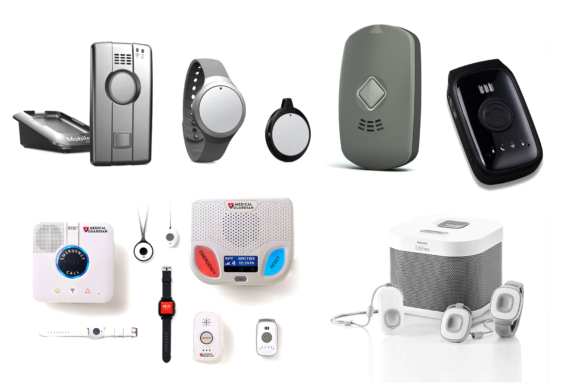
Are Bulk Medical Alert Payment Options a Good Choice?
Bulk payments consist of annual, semiannual or quarterly options and save you anywhere from $1 to $10 in monthly medical alert system costs. We found that choosing to make bulk medical alert payments saves you an average of $4 per month.
How Can I Cancel My Medical Alert Service?
Most of the best medical alert services allow you to cancel at any time without any penalties or fees. We recommend you read our medical alert reviews to find the best option for you and avoid signing any long-term medical alert contracts.
What Is Involved with Medical Alert Refund Policies?
Many of the medical alert services that we reviewed offer users a full refund within a set timeframe, which is typically 14 to 90 days, depending on the company. If you choose to cancel medical alert service after that, most companies prorate their medical alert refunds based on when you canceled and how far in advance you paid for the service.
Be sure to remember that every company is going to have different medical alert refund policies, so it’s important to contact them directly with any questions you might have about your unique circumstance. And you should be sure to keep good records on any communication you have with your medical alert provider.
Can I Get a Prorated Refund with a Medical Alert Bulk Payment?
Most medical alert companies offer a prorated refund for users that make bulk payments. But if you think there could be a valid reason for you to cancel your medical alert service down the line, you should check with your company about their specific policy. Some medical alert companies have an “initial refund policy” for bulk payments, which means they don’t offer any refunds after a specific period of time, which is typically 30 days.
What Is a Lockbox and Is It Worth the Added Cost?
Lockboxes are simple containers with a combination lock. They are used in many industries, including real estate sales, but when it comes to medical alert systems, they’re used as a means to give emergency responders access to your house keys to get to you when you need help but can’t unlock the door.
We highly recommend adding a lockbox service to be used with your medical alert system. If you are unconscious when EMTs get to your home, they will have to break down your door or smash a window to get to you. Not only does this do damage to your home, but it also means it will take longer for emergency responders to give you life-saving medical care.
How Pushy Are Medical Alert Service Sales Teams?
Most of us expect salespeople in any industry to be on the aggressive side. After all, they make their living by selling products. But we didn’t find any of the medical alert companies we reviewed to be overly pushy when it comes to sales tactics. They obviously wanted to make a sale but they were also pleasant and professional.
But if you want to choose a medical alert system on your own, you should avoid handing over any of your personal information, including your email address and phone number. Look for companies that offer plenty of online resources to help you make your choice, including comprehensive medical alert FAQ pages, product guides, and helpful senior living articles.
Want to avoid dealing with salespeople? Check out our medical alert Editor’s Choice.

Are There Red Flags in Medical Alert Terms and Conditions?
While most medical alert contracts include typical terms and conditions that shouldn’t cause you any concerns, there are some things you should consider before signing up for any medical alert service. Important medical alert terms and conditions to keep in mind include:
Liability waivers are standard and absolve medical alert companies from any damage or injuries that occur due to device or call center failure. This clause keeps medical alert companies from being sued due to a human or technical error.
Maximum liability clauses place a cap on any payouts that result if a medical alert company is sued for any reason. Typical max liability amounts range from $200 to $2,000.
False alert fees are common in the medical alert industry and are put in place to protect emergency monitoring call centers from being abused. If a user is hitting their device’s help button dozens of times a day just to chat or play games, the wasted time and resources could cost the company thousands of dollars, as well as put other users in danger by taking up the time of the company’s operators.
Why Are Most Medical Alert Companies So Similar?
If you spend a good amount of time looking at medical alert systems like we did when writing or reviews, you’re sure to notice some similarities amongst the companies. Most noticeably, many of the top medical alert companies tend to use the same devices and call centers.
In many cases, the only difference seems to be the name at the top of the monthly bill. This is because there are only so many medical alert manufacturers and monitoring centers. All of the top companies use the same resources because they want to be able to offer the best products.
Which Medical Alert System Has the Best Service?
We prefer GreatCall both as a company and a service. The customer service is very helpful, and the website is very informative. Moreover, the company as a whole is one of the few medical alert companies leaning into the future with smartphones and fitness trackers for seniors.
Choosing the best medical alert system comes down to personal preferences and taking the time to do some research. Although we don’t know anything about your lifestyle, location, or budget, we put a lot of time into finding the best medical alert services on the market to save you some time and trouble with the following recommendations.
Medical Guardian has best-in-class customer support, customizable medical alert service options, and no equipment or set-up fees.
MedicalAlert provides users with free equipment, 24/7 monitoring and fall detection, and even offers caregivers an easy-to-use mobile app.
GreatCall has the fastest medical alert response times, offers devices with built-in GPS for location-based monitoring, and has IAED-certified emergency response operators.
